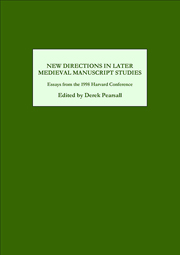Book contents
- Frontmatter
- Contents
- List of Illustrations
- Acknowledgements
- Introduction
- Recent Directions in Medieval Manuscript Study
- Another Fine Manuscript Mess: Authors, Editors and Readers of Piers Plowman
- A New Approach to the Witnesses and Text of the Canterbury Tales
- Prospecting in the Archives: Middle English Verse in Record Repositories
- Medieval Manuscripts and Electronic Media: Observations on Future Possibilities
- Representing the Middle English Manuscript
- Skins, Sheets and Quires
- Reconsidering the Auchinleck Manuscript
- Professional Readers of Langland at Home and Abroad: New Directions in the Political and Bureaucratic Codicology of Piers Plowman
- Professional Scribes? Identifying English Scribes Who Had a Hand in More Than One Manuscript
- Manuscript Production in Medieval Theatre: The German Carnival Plays
- The ‘Lancelot-Graal’ Project
- After Chaucer: Resituating Middle English Poetry in the Late Medieval and Early Modern Period
- Notes on Contributors
- Index
After Chaucer: Resituating Middle English Poetry in the Late Medieval and Early Modern Period
Published online by Cambridge University Press: 05 September 2014
- Frontmatter
- Contents
- List of Illustrations
- Acknowledgements
- Introduction
- Recent Directions in Medieval Manuscript Study
- Another Fine Manuscript Mess: Authors, Editors and Readers of Piers Plowman
- A New Approach to the Witnesses and Text of the Canterbury Tales
- Prospecting in the Archives: Middle English Verse in Record Repositories
- Medieval Manuscripts and Electronic Media: Observations on Future Possibilities
- Representing the Middle English Manuscript
- Skins, Sheets and Quires
- Reconsidering the Auchinleck Manuscript
- Professional Readers of Langland at Home and Abroad: New Directions in the Political and Bureaucratic Codicology of Piers Plowman
- Professional Scribes? Identifying English Scribes Who Had a Hand in More Than One Manuscript
- Manuscript Production in Medieval Theatre: The German Carnival Plays
- The ‘Lancelot-Graal’ Project
- After Chaucer: Resituating Middle English Poetry in the Late Medieval and Early Modern Period
- Notes on Contributors
- Index
Summary
If text is both ‘authority … Holy Scripture’ (textus) and ‘tissue’ (textile) and if forensics is both the manipulation of argument to sustain a proposal (rhetoric) and the, apparently objective, empirical study of the evidence on which this proposal relies for its probity (science), then current theoretical and practical work in textual scholarship should probably be placed at several mutually contradictory positions on an epistemological scale.
One of the major issues that faced humanities scholarship in the final decades of last century is the status of evidence, a topic explored in print in the January 1996 issue of PMLA, and one which has been variously taken up by a number of modern textual critics, including several medievalists who have recently been exploring the relative merits of the ‘old’ and ‘new’ philologies. As the quotation from David Greetham at the head of this essay suggests, such a topic has important, if also sometimes uncomfortable, implications for both modern editors and codicologists in the brave new postmodern world of epistemological uncertainty in which we find ourselves. The forensic mentality espoused by Greetham is one that recognizes the semantic flexibility of the key terms ‘text’ and ‘forensic’. On the one hand, ‘text’ is seen as a concept that can be fixed and authoritative, but, on the other, it is described as ‘textile’, something that is layered and woven, and therefore logically capable of being unwoven in different ways. And ‘forensic’, for Greetham, not only represents a scientific approach to current textual theory and its application, but also enjoys a more subjective rhetorical value.
- Type
- Chapter
- Information
- New Directions in Later Medieval Manuscript StudiesEssays from the 1998 Harvard Conference, pp. 183 - 200Publisher: Boydell & BrewerPrint publication year: 2000



